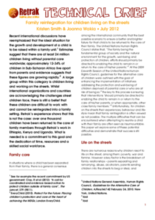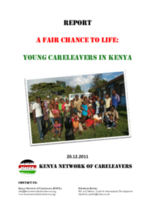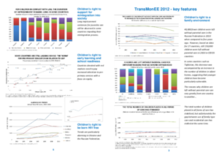Displaying 891 - 900 of 962
Retrak’s technical brief on family reintegration for children living on the streets, acknowledges the difficulties which street children face at home and on the streets. But it also demonstrates that successful family reintegration is possible for street children when there is a focus on the individual child, building positive attachments with care-givers, strengthening families capabilities and involving the wider community.
This video showcases the Family-based care program of Save the Children and its partners in Indonesia.
This article reviews the emerging literature on transnational parenthood, concentrating on six themes: gender, care arrangements, legislation, class, communication and moralities.
Documenting the young people‘s own views of what has happened during the time of leaving care and afterwards, this study explores in-depth the experiences of care leavers during the dynamic phase following their separation from an institutional care setting.
This Charter lists the promises that care leavers want the central and local governments to make. The Charter for Care Leavers is designed to raise expectations, aspirations and understanding of what care leavers need and what the government and local authorities should do to be good “Corporate Parents.”
TransMonEE is a database that captures a vast range of data on social and economic issues relevant to the situation and wellbeing of children, adolescents and women in 28 countries of Central and Eastern Europe, Commonwealth of Independent States and the European Union. This document includes inter-country comparisons of data on several issues related to children’s care.
This monograph reviews literature pertaining to children without permanent parents.
The authors of this article carried out a follow-up study of 143 young adults leaving kinship care. They assessed the young adults’ transition to adulthood with interviews and questionnaires. A small part of the sample presented serious problems of social exclusion. Seventy percent had found employment or were in higher education. The youth had frequently suffered the loss of foster carers and lack of support.
This paper is based on research into the transition of young people leaving public care in Romania.
Understanding youth transitions from out of home care must include developing countries. A model is presented to facilitate this global integration. The model combines resilience and social capital within a social ecology of support. Use of the model is illustrated by a South African youth mentoring scheme for care leavers.




